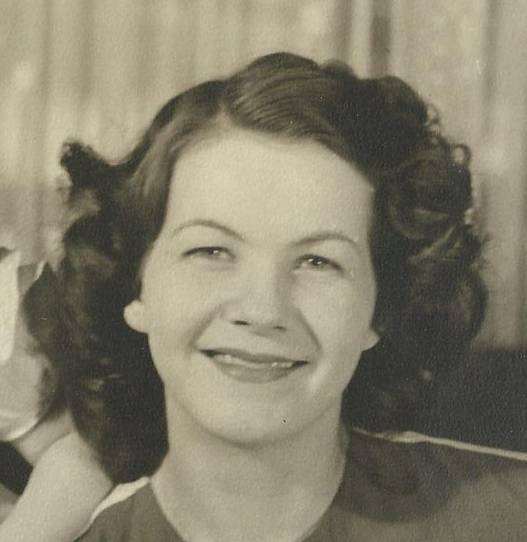
Irene Arbutus Elswick Norris
I was born in the small mining town of Minden, West Virginia, located in the Southern Appalachian mountains. My parents were William Roy and Alice Sophronia Elswick. When I was three years old my father was killed in a mining accident, leaving my mother with ten children and another one expected. My baby brother, Calvin, who was a few months old, died the day after my father was killed. The coal company, needing the house we lived in, gave my mother a house in Pax, West Virginia. The next year my six-year-old sister passed away. My mother had a difficult time making a living even with a small pension from the coal company. She took in sewing, washing and ironing . The house had no plumbing, electricity or water. We children had to carry water for everything, plus coal and wood for heat and cooking. So when the opportunity came for girls to go away and work, my sister, Edith went to Maryland to work in the munitions factory. She came home in 1942 for a visit and talked my mother into letting me go back with her. As there were no job opportunities around the area, my mother agreed.
I worked at Triumph Explosives making machine gun shells and then detonators from 1942 until 1944. We worked long hours, sometimes 16 hours in one shift. It was very hard to keep awake on the 4pm to 8am shift. There were about 6 assembly lines in our building and you could hear everyone singing to keep awake. I remember they had all the black workers in a building next to ours and it was enjoyable to listen to their songs. It was dangerous work and some of the girls were injured in explosions. It seemed the ones who were afraid or worried were the ones to be injured. I remember one girl who told us she was afraid to go to work a certain day as she had the job of carrying the loaded detonator trays and storing them in the ammunition magazines. She said it was overloaded. Later in the day there was an explosion and she was killed. One of our bosses also confessed to being nervous and she had to relieve the girls on the line and she was running a press when it exploded and cut up her arm pretty badly. She did return to work her job.
I guess like all young people we didn’t think much about the war. We knew friends and family were away fighting in the war. We saw long convoys of heavy war equipment and trucks full of servicemen passing on the highways. Also we had air raid drills and blackouts, shortages of certain foods, gas and shoes; however, everyone just took it in stride.
I did keep in touch with one of our bosses until three years ago when she passed away. I still talk on the phone with one of the girls-in fact she was the one who told me of the Rosie movement.
When I first went to Maryland I boarded on a farm in Appleton, Maryland, about five miles from Newark, Delaware. Due to gas rationing our landlady had to drive us into Newark to catch a work bus. She could only make a couple trips a day so there were no shopping trips or trips of any kind other than for work. So in 1943 we decided to move into Elkton, Maryland. We only had a room and took our meals out. We could walk to and from work, which we enjoyed. There were eight girls living there. We all got along great and were friends with girls in neighboring homes. We entertained ourselves with movies, taking long walks, shopping and playing croquet. Sometimes on a Sunday some of the servicemen passing would come in and play a game. We also went to the USO and rolled bandages twice a week for the Red Cross. We hitched a ride to a Baltimore park one Sunday, stayed all day and came home so sunburned we had to miss a week’s work!
About this time my sister Edith joined the WAVES. I also had a brother in the Army and another in the Navy. I met my future husband as the lady we boarded with was his aunt and he came to visit.
In August 1944 my mother decided to move from West Virginia to California. I had a sister there who wanted to work and needed a babysitter. My mother, who had never traveled, didn’t want to make the trip alone so I decided to go with her and my younger brother. I got a job at Richmond shipyard as a welder. In welding school I received the honor of Number One Welder. I only worked there until February 1945 when I returned to Maryland to be married. I boarded the train and was surprised that the train was full and overflowing with servicemen. I wasn’t promised a seat and as I expected to spend four days and three nights on this train, I was really worried about how I could manage. As it happened, one sailor had saved a seat for his friend who missed the train and the sailor gave the seat to me. You can bet I was one thankful girl. He even provided me with box lunches, which were about the only meals available. Just listening to the servicemen singing and joking you wouldn’t know there was a war going on. I got back to Maryland on Valentine’s Day. I married my sailor, Laurence Norris, on April 7, 1945. When he was discharged we moved to Detroit, Michigan. We raised seven children and now have 16 grandchildren. We have had a good life. I often wonder where I would be now if I had not taken the opportunity to work during the war years.
